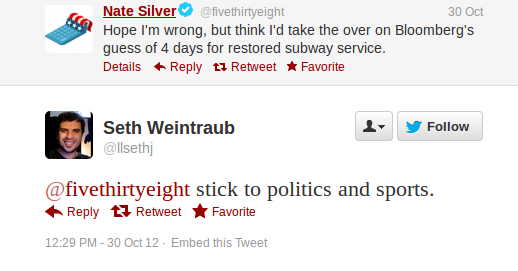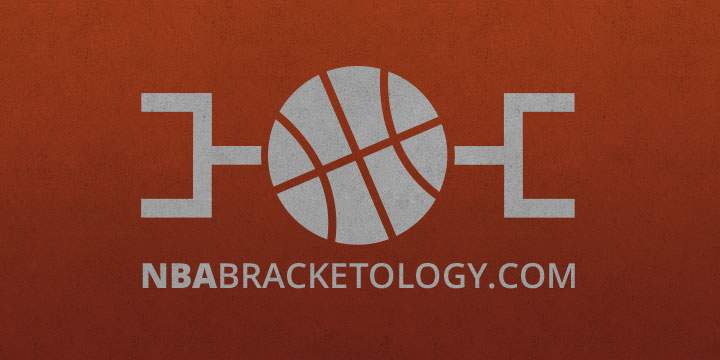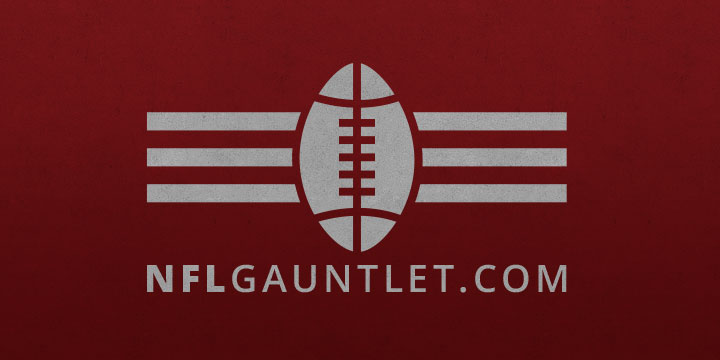Sports and politics don’t mix. Bringing the two together leads only rarely to something wonderful, such as FiveThirtyEight blog. More often it leads to “STICK TO SPORTS”. We’ve become so polarized the two have finally met:

Tweet found at, and post inspired by, deadspin.com’s “Who’s being told to “Stick to Sports”?” series.
At TheSportsGeeks we don’t let holidays go unnoticed, and if you live in a swing state you may be aware there’s a Presidential election on Tuesday. I’ll bravely wade into these waters with the life-jacket of merely presenting issues you may not have thought of, rather than positions you must adopt.
Locating the Stadium
There are a multitude of political issues involved in the attraction or retention of a franchise. Where do you build the stadium? Do you subsidize it? How much? How do you pay for that?
You might assume that the recent relocation of the Formerly New Jersey, Now Brooklyn, Nets (FNJNBN) involved some or all of these questions, but really it began with a wholly separate public policy issue: eminent domain.
Malcolm Gladwell at Grantland explains that the FNJNBN move had nothing to do with basketball. A real estate developer, Bruce Ratner, wanted to put luxury apartments in a prime Brooklyn spot but had no way to kick out the people who lived there. As Gladwell points out, the Supreme Court has explicitly mentioned stadiums and arenas as justifications for states to undertake eminent domain. So Ratner bought the FNJNBN, added the Barclays Center to his blueprint, and got New York to kick out anyone in his way. Once he had his land he passed off the basketball team to At The Time Future, Now Former, Russian Presidential candidate Mikhail Prokhorov. But our focus here isn’t owner/politicans, it’s the politics of eminent domain. Is it worth it for a city to displace its residents in the name of the Economic Development that the Nets might bring?
Subsidizing Sports
The logical next question was raised before: Do sports teams bring those magical Economic Development dollars?
Surely you’ve heard the argument made that a sports team generates cash for the city, and that it therefore makes sense to provide an incentive to attract/keep teams. But this is not a settled question: you can find arguments against it at Freakonomics, for instance. If you live in a city with a pro franchise chances are this question affects you in more ways than you realize.
Subsidies don’t only come in the form of cold, hard, taxpayer cash. Cities can take scarce public resources and allocate them to a franchise. Examples of this are space (eminent domain), road construction dollars (widening access to an arena), or cheap loans.
When subsidies are debated–the recent example discussed in the above Freakonomics post is Sacramento’s $255 million spent to keep the Kings in town–voters are left with a decision: do I like my team enough to personally contribute cash?
Monopolized Markets
Once your town decides to have a franchise, you have to find out how you’ll watch the game. Unless you’re springing for season tickets and personal seat licenses, this means you’ll have to scroll through the TV guide to your local sports network. But even this involves an ongoing federal political struggle.
Let’s take for instance my city, Philadelphia. The rights to most Phillies, Sixers, and Flyers games are controlled by Comcast. Comcast televises those games on CSN Philadelphia. You can get that channel, of course, by purchasing service from Comcast. You can actually also get it from Verizon Fios, but Fios is not available in much of the city. If you want to buy the channel through a satellite provider you’re out of luck. Comcast won’t sell the channel to DirecTV or DISH Network.
The satellite companies argued that Comcast was abusing its monopoly power in this market and actually convinced the FCC to order Comcast to negotiate a fair price. Two years ago. A judge confiirmed the order. A year ago. You still won’t find CSN Philly on your channel guide if you have satellite and I haven’t seen anything indicating it’s coming soon.
So if you’re not in an area covered by Fios and you want the Phillies, Sixers, and Flyers, you have one provider and one provider only. And if you don’t like that provider–they earned the title “Worst Customer Service” in this recent Lifehacker poll*–you’re very interested in the political question of how much power the federal government has to regulate the telecoms.
Closing Argument
This is hardly an exclusive list. It’s unlikely your ballot will ask you about these issues. Neither President Obama nor Governor Romney, sadly, have campaigned on a platform of creating a college football playoff system. But hopefully I’ve shown you that the notion that sports and politics don’t mix couldn’t be more wrong; in fact, they’re inextricably linked.
*Lifehacker’s servers are currently down due to Hurricane Sandy. Here’s a cached version


